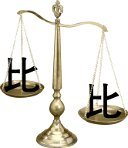Graded comparisons in Mandarin Chinese
(You might want to have a look at the basics of comparing in Mandarin before reading this article.)

When you’re talking about the difference between two things, you often want to express the size of that difference. English uses modifiers like “much”, “a little bit” and “far” to modify comparisons - “That building is much taller than this one” or “This book is far more interesting than that one”, for example. This article covers how to use graded comparisons in Mandarin Chinese.
Big and small differences
To modify a comparison, all you have to do is add some words to the end of the sentence:
[noun 1] 比 [noun 2] [adj] *[modifier]*
To express a large difference, you just need to tag 得多 (de duō) on to the end. Examples:
他比我高得多。 tā bǐ wǒ gāo de duō He is a lot taller than me.
这本书比那本书有意思得多。 zhè běn shū bǐ nà běn shū yǒu yì si de duō This book is much more interesting than that book.
For a small difference, you can use 一点儿 (yī diǎnr):
这件大衣比那件便宜一点儿。 zhè jiàn dà yī bǐ nà jiàn pián yi yī diǎnr This coat is a little bit cheaper than that one.
你的花园比我的漂亮一点儿。 nǐ de huā yuán bǐ wǒ de piào liang yī diǎnr Your garden is a little bit more beautiful than mine.
Specifying the difference
Saying exactly how much two things differ is also straightforward. You just add the specific difference on to the end of the sentence, like the modifiers above. For example:
那个楼房比这个高十米。 Nàge lóufáng bǐ zhège gāo shí mǐ That building is ten metres taller than this one.
这个箱子比那个重两公斤。 zhè ge xiāngzi bǐ nàgè zhòng liǎng gōngjīn This box is two kilograms heavier than that one.
